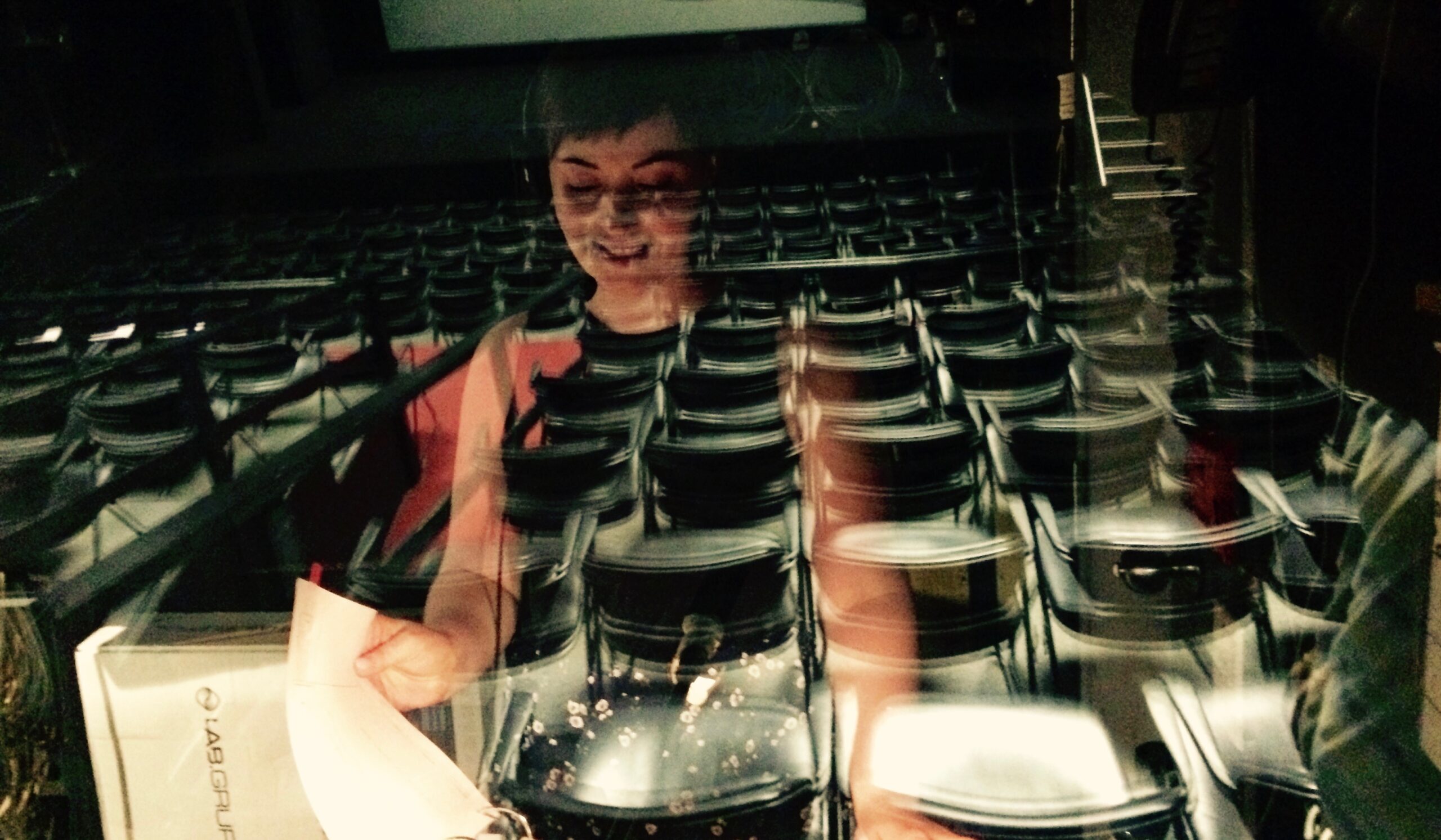Kate Sandeson. This is You. Everybody Look at Her.
Kate, this is you behind the glass of the sound and lighting booth at the Tarragon Theatre.
You insisted you be obscured in some way for this picture because you don’t feel comfortable having your photo taken. You didn’t insist on it as much as suggest it. Actually, you facilitated it. Persuasively. In only the way a gifted stage manager knows how. It was my idea to shoot through the glass, but then I said, “Maybe we should shoot this from inside the booth as well, as an option.” Then, Kate, you said you really thought it should be done outside the glass, and I said, “It is a pretty nice shot with the reflection of the chairs and everything.” Then you said, “So let’s do that.”
Wait, did you just decide what the pic for this article is going to be while making me feel like I made the decision?
Kate, you were the stage manager for The Summoned, a six-hander at the Tarragon Theatre mainspace, a play that had a giant screen for a set and over 450 visual and sound cues in less than ninety minutes. What this means is that you, Kate, during the rehearsal process, had to prep a master script that would allow you to anticipate the precise moments in the action that would allow you to call out sound and lighting cues to an operator who would make them happen at exactly the right time. In some cases there were so many cues in a scene that you prepped in such a way that it would be possible for you yourself to be pushing buttons simultaneously, making other cues happen while you called out the initial ones. All while I was handing you rewrite after rewrite that would change your master script to the point of you having to reprint and rewrite every single cue back into the script. And never once did you make me feel the pressure to limit my creative exploration, no matter how hard it made your job.
Add to that the fact that on opening night, as you were following along in the master script, juggling however many parallel levels of cue calling that were going on, you were right there on the “god mic” when I called for line. TWICE. Making it look to most like it was part of the show.
Add to that the fact that you called the cues for a ten-minute scene in which I, as an actor, interacted dialogically (not an actual word) with a moving image on the big screen. That scene had over forty-seven projected QuickTime movies with accompanying recorded dialogue that had to be interjected between lines of live dialogue. What you did there takes more than just organizational skills and painstaking preparation. It takes something you can’t teach. Timing. Comedic timing.
As far as I’m concerned, Kate, you were on stage with me and I want everyone to know it. And what’s more is I know you’re going to hate it.
When I asked you if you’d be into me interviewing you, you were all like, “Why would you want to interview me?!” When I mentioned I might take a photo of you for the article you seemed annoyed, but still came in that day looking a little extra “photographable.” You hated having the microphone in your face, but when you spoke you had complete command of your charms. I wouldn’t go as far as to say you were enjoying being the centre of attention, but you were in your element.
As the Decemberists say, “You were meant for the stage.” It was clear.
Is this killing you? Are you beet red right now?
During the interview we talked about your gateway into stage management while you were in high school in your home town of Truro, Nova Scotia. You said that you wanted to be an actor first. You said, “Of course I wanted to be an actor. What else is there to want to be when you’re in high school?” You told me you thought maybe a lot of stage managers started out wanting to be performers. For you, you loved the community of people in the theatre, but realized quickly that you—
“Hated the feeling of being on stage and being looked at.”
Hm. That’s weird.
Because now that I’m thinking about it, the giant screen in our play was the biggest set piece on stage. And it was used in every scene. And was maybe the most “looked at” thing in the entire show. If there was a star on that stage, that screen was it. And you were controlling it.
And not one audience member would recognize you leaving the theatre.
I have nothing short of a duty to expose you, Kate. I want people to know what you look like. I want you to be on the fucking poster. Why would I want that? When I know how hard you work to keep yourself obscured?
Because you deserve it.
You don’t get to be talented and funny ‘da shit and then run and hide. No matter how much it hurts to be pointed at and admired and adored, you deserve it. You don’t get to stroll into the dressing room at the end of each show and drop some mad notes and then ride off into the night on your bike like some sexy Bourbon-swilling Mary Poppins. Isn’t it interesting this role of the stage manager? The most important person in the production that you never see. All points converge at you. Yet you are a ghost.
Not this time, Kate.
To anyone still reading, please do me a favour and look at Kate. Everybody look at her. Everybody scroll back up to the top of this page and take a good long look at Kate. Look at that picture of Kate for an uncomfortably long time and then, when you want to stop looking at Kate, when you feel like maybe it’s inappropriate to be looking at Kate for that long, look a little longer at Kate.
If for no other reason than you know she’s turning four shades of magenta as you do it.
Kate Sandeson was born and raised in Truro, Nova Scotia. She graduated from the National Theatre School’s production program in 2010. She apprenticed with the Charlottetown Festival, Tarragon Theatre, the Shaw Festival, and with 2 Pianos 4 Hands. Kate has worked with several companies including Soulpepper, Mirvish, Young People’s Theatre, Outside the March, and she sits on the Canadian Actors Equity Council as the stage management representative.









Comments